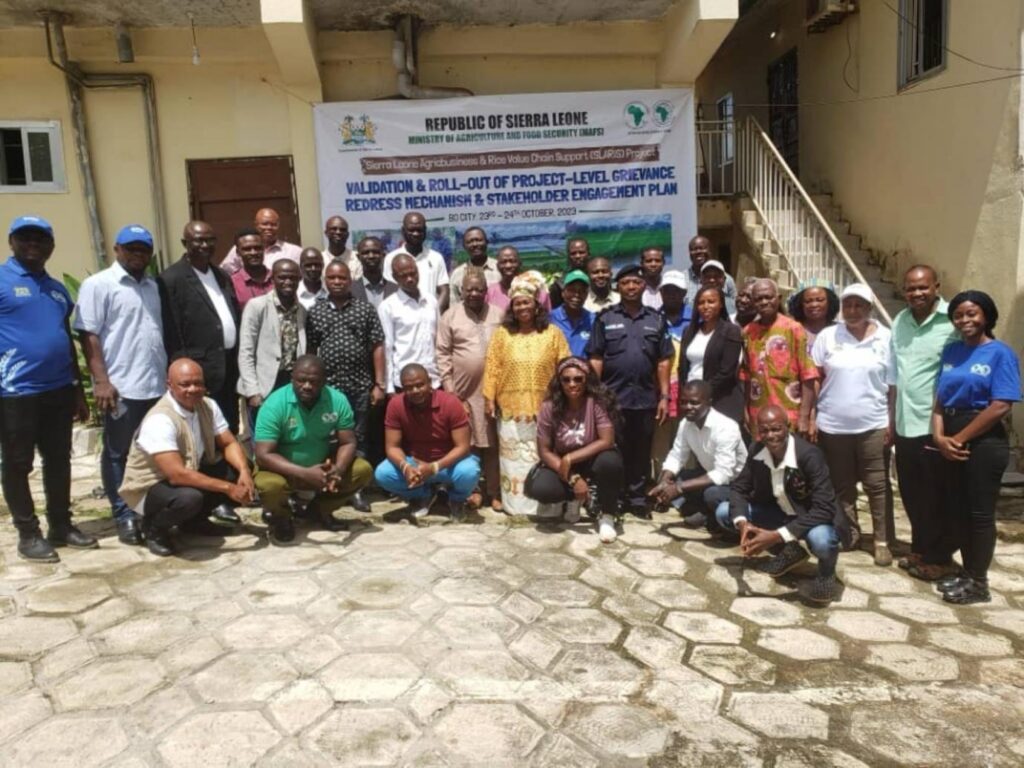Engagement Plan to Project Affected stakeholders and communities Bo Town, Sierra Leone – On October 24, 2023, the Sierra Leone Agribusiness and Rice Value Chain Support (SLARiS) Project, under the Ministry of Agriculture and Food Security, successfully concluded a two-day workshop on the Grievance Redress Mechanism (GRM) and Stakeholder Engagement Plan at the J&E Hotel in Bo City.
The workshop aimed to disclose the draft GRM and SEP instruments to participants and solicit their input to ensure that it is an effective channel for addressing concerns at various levels and promoting ownership of the instruments. In his opening remarks, Mr. John Maada Sinah, the acting Project Manager for SLARiS, emphasized the importance of the GRM in ensuring that the project is implemented fairly and transparently. He also encouraged stakeholders to actively participate in the workshop and provide feedback on the draft GRM and SEP documents. He reminded participants about govt determination to FEED Salone and SLARiS project aligns with the FEED Salone flagship program. Madam Mamie Tucker, the Monitoring and Evaluation Specialist, gave a presentation on the overall goals and objectives of the Solaris Project. She highlighted that the project is jointly funded by the African Development Bank (AfDB) and the Government of Sierra Leone. Its project development objective is to transform the agricultural input supply sub-sector as a viable and inclusive business opportunity, to promote enhanced production and productivity required to improve the livelihood of beneficiaries along priority value chains (rice and maise). The project plans to produce 500Mt breeder rice seeds, 100Mt breeder maize seeds, 9,000Mt of foundation rice seed, and 1800Mt of foundation maize seed. Mr. Aiah Steven Ngaujah, the National Seed Expert, briefed stakeholders on the availability of quality and viable seeds to farmers. He outlined the stages through which seeds will reach farmers, with a focus on collaboration with various organizations. Mr. Joseph Kaindaneh, the Environmental and Social Safeguard Specialist, presented the draft GRM document. This document addresses concerns such as water pollution, pesticide misuse, noise from milling operations, and rice husk generation. It establishes multiple channels for project-related individuals to lodge complaints and ensures regular monitoring and reporting. The workshop also featured a panel and plenary discussions with stakeholders on the draft GRM and SEP document. Participants shared their insights and recommendations on how to improve the document. The workshop concluded with a closing ceremony, where Mr. Sinah thanked participants for their contributions and expressed his commitment to finalizing the GRM document in consultation with stakeholders. The SLARiS Project workshop brought together a diverse group of stakeholders, including representatives from Njala University, the Environmental Protection Agency (EPA), the National Farmers Federation Sierra Leone(NaFFSL), ONS, SLeSCA, Paramount Chiefs District Councils etc from Kenema and Moyamba Districts. A similar engagement was held in the Kambia district from the 19 – to the 20th of October, 2023.
